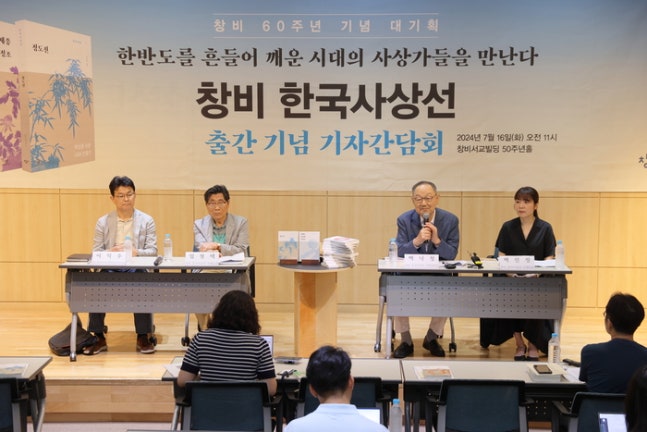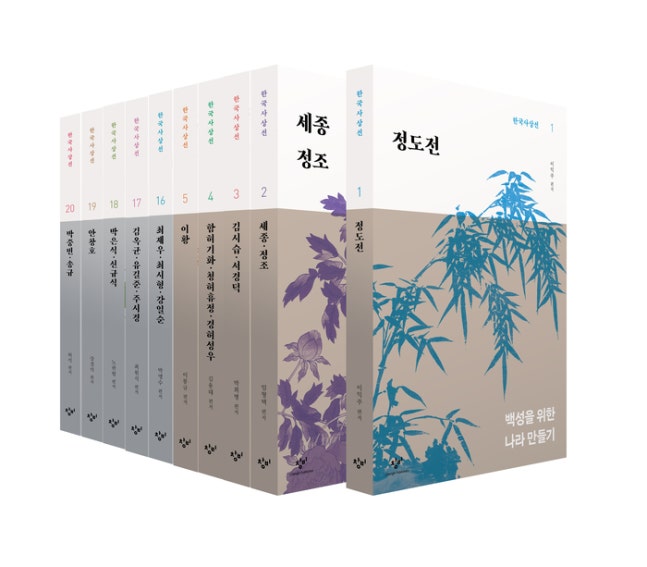
Baek Nak-cheong, honorary professor at Seoul National University, speaking at the press conference for the release of the Changbi History of Korean Thought at Changbi Seogyo-dong headquarters on the morning of the 16th. Provided by Changbi,
,
, ‘Changbi’s collection of the major works of 59 master thinkers of Korean thought after the 14th century, titled ‘Changbi History of Korean Thought,’ is being released in a total of 30 volumes. Starting with Jeong Do-jeon, the architect of the Joseon Dynasty, and ending with former President Kim Dae-jung, this collection covers from the establishment of the Joseon Dynasty to the late 20th century.’,
,
, ‘In February 2021, the ‘Changbi History of Korean Thought Editorial Committee,’ chaired by Baek Nak-cheong, honorary professor at Seoul National University, with 9 publication committee members, has been preparing for the release for over 3 years. The first batch of 10 volumes has been released.’,
,
, ‘Professor Baek Nak-cheong said at the press conference on the 16th, “The planning of the Changbi History of Korean Thought began with the awakening that the precariousness of the era, in which we can’t be surprised even if the end of the world is imminent, demands an unprecedented civilizational transformation,” and “Not because Koreans need to know due to being inferior compared to the global standard, but because Korean thought has its own distinctiveness that is worth presenting to the world.”‘,
,
, ‘The publication committee pointed out why we should seek a spiritual compass in Korean thought to navigate through the era of confusion. While acknowledging the limitations of Western thought in responding to today’s crises as it does not reflect the experiences of ‘here and now,’ they emphasized that Korean thought has the potential to contribute to solving global crises. This confidence in the publication is also attributed to the fact that Korean popular culture is gaining global influence and Korean literature is gradually gaining presence in the world literary scene.’,
,
, ‘One of the distinctive features of the publication is that it includes figures that have not been well treated in existing studies on thought history. Not only scholars like Yi Hwang and Yi I, but also rulers (Sejong, Jeongjo), religious figures (Choe Chi-won, Choe Chi-sung, Gang Il-sun), women (Im Yunji-dang, Yi Saju-dang, Kang Jeong-il-dang, Na Hye-seok), literati (Im Hwa, Yeom Sang-seop, Kim Su-young, Shin Dong-yeop), and politicians (Kim Dae-jung) were selected as major thinkers.’,
,
, ‘Professor Im Hyeong-taek, honorary professor at Sungkyunkwan University, explained, “Former President Kim Dae-jung was evaluated as an intellectual who struggled for the resolution of national historical tasks such as Korean democracy and reunification,”.’,
,
, ‘Professor Baek Min-jeong of the Department of Philosophy at Catholic University said, “A lot of effort has been put into organizing the original texts into easily understandable sentences so that modern Korean readers can easily read and use them as a resource for reflecting on their lives.” Due to the temporal characteristics, the works of major thinkers are mostly written in classical Chinese characters, and even figures from the early 20th century wrote in a difficult to decode mixture of classical Chinese and vernacular Korean styles.’,
,
, ‘Lee Ik-ju, the editor of the
,
, ‘The professor said, “Jeong Do-jeon valued the people and emphasized the public nature of the king’s position. Was there anyone in the world in the 1390s who told such a story?” and said, “His thought, which demanded heavy responsibility for power, still resonates in 21st century Korea.”‘,
,
, ‘The ‘Changbi History of Korean Thought’ is scheduled to be completed with a total of 30 volumes by releasing an additional 10 volumes each in 2025 and 2026 when Changbi celebrates its 60th anniversary.’,
,
,

,

